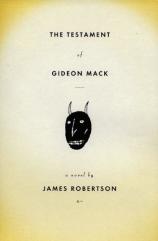The Testament of Gideon Mack
About the Book
The Testament of Gideon Mack
When Gideon Mack falls into a ravine while rescuing a fellow minister’s dog, he begins a journey that will take him, figuratively and literally, out of this world. Swallowed up in the roaring rapids of the legendary Black Jaws, he is assumed dead by one and all, and when he is spit out three days later, somehow alive, the outrageous story he tells of how he survived is met with disbelief and derision. Gideon claims it was the Devil who saved him, that the Devil healed his broken leg, engaged him in personal and philosophical discussion, and stole his shoes.
Gideon Mack is a man riddled with paradox: a minister who does not believe in God but comes face-to-face with the Devil, a pillar of the community who is widely admired while living a lie but denounced as insane when he tells the truth, a man who has repressed his passions all his life but has an affair with his best friend’s wife. In James Robertson’s skillful hands, these paradoxes not only make Gideon a fascinatingly complex and continually surprising character but suggest the larger issues that underlie his story. The Testament of Gideon Mack takes a multifaceted look at how religious belief manifests in our particular historical and cultural moment. From Gideon’s own coldly angry father, for whom the Bible is the only book worth reading, and the self-righteously puffed-up Peter Macmurray to the contemptuously agnostic Miss Craigie and Gideon’s own brand of practical hypocrisy, the religious views expressed in the novel cover a wide spectrum. The Devil himself feels sorry for God, given the fickle nature of human faith and the horrors committed in his name. The novel also poses questions about the reliability of human perception and indeed about the nature of belief itself. People, the novel seems to suggest, believe what they want to believe. Gideon claims to find a standing stone on a path he has run for years. One day it is suddenly and inexplicably there. Or is it? No one else sees it, and when Gideon photographs it—using old film—it doesn’t show up. But he touches it, embraces it, pounds his fist against it, and it is entirely real to him. But then so is the Devil. Readers must decide for themselves—Robertson is careful not to tip his hand—whether or not Gideon is lying or delusional or, if he is being truthful and accurate about his experience of the supernatural, what that implies about the nature of reality and the relationship of belief to perception.
But The Testament of Gideon Mack is much more than an epistemological investigation or a critique of religious belief. It is a fast-moving, beautifully written, often funny and always engaging story of one man’s inner life and outer experience as he comes to know the truth of himself. Robertson artfully frames the narrative Gideon spent his final days writing with the skeptical voice of a publisher weighing the potential sales of a scandalous memoir against the likelihood of lawsuits. But what is at stake in the story itself—for “those who have eyes to see,” as Gideon writes—far surpasses mundane considerations of profit and loss.
The Testament of Gideon Mack
- Publication Date: March 22, 2007
- Hardcover: 400 pages
- Publisher: Viking Adult
- ISBN-10: 067003844X
- ISBN-13: 9780670038442








